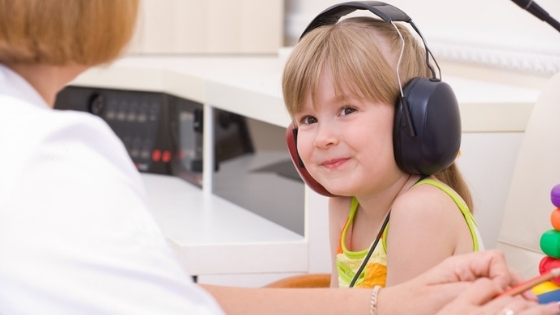Hearing problems in children can have a huge impact on your child’s language and speech skills as they grow up. In the past hearing problems were often only diagnosed around the age of two years old when it became clear that the child was not starting to talk.
If a child is diagnosed before the 6 month age mark and certain steps are taken it can significantly improve the outcome. For this reason newborns are often given a hearing test to help to detect any hearing problems a baby may have. In the USA all babies are given hearing tests, for other countries you will need to check what the policy is. If your child is not automatically given a hearing test it is advisable to arrange one privately for your baby.
While a hearing test will give you a good indication of your child’s hearing it is very possible for your baby to fail the test for various reasons even if he does not have hearing loss. Your baby may have vermix in the ear or fluid in the middle ear which makes it hard to hear.
In some cases your baby may pass the hearing test but have hearing loss. This can be because certain pitches might not be picked up by the hearing test. Your baby may also have no hearing problem at birth but later on develop hearing loss.
For these reasons it is important to schedule follow up hearing tests to ensure that the diagnosis is correct and to pick up any future problems.

Signs Of Hearing Loss in Babies and Children
The sooner hearing loss is diagnosed the better and while you can schedule regular hearing tests for your baby or child it is important to take note of the signs of hearing loss so that you can pick up a problem.
How to see if my baby has hearing loss may be a question you are asking and the younger your baby is the trickier it will be, but as they get older there are certain signs that will become noticeable.
If your child does not reach certain milestones your child may have a hearing problem and you should schedule a visit to your pediatrician as soon as possible.
It is important to take your child to a specialist since at times what may appear to be a hearing problem may in fact be an auditory processing disorder, which is where there is nothing wrong with your child’s hearing, the problem lies in the way that your child processes the information. A specialist will be able to correctly diagnose any problems your child may be facing and recommend the correct treatment.
Here are the things that you need to look out for when it comes to hearing loss:
From Birth To Four Months Old
- Startle when there are loud sounds
- Respond to your voice
- Calm down on hearing a familiar voice
- Wake up or stir when there are loud noises
From The Age Of Four Months To Nine Months Old
- Understand and mimic basic hand motions such as waving goodbye
- Turn head towards sounds that are familiar
- Notice toys that make a sound
- Make babbling noises
- Smile when being spoken to
From The Age Of Nine Months to Fifteen Months Old
- Respond to his or her name
- Make a variety babbling sounds
- Repeat simple sounds
- Understands some simple verbal requests
- Uses his or her voice to get your attention
From The Age Of Fifteen Months To Two Years Old
- Makes use of many simple words
- Can name some common objects
- Can point to body parts when they are named
- Listens and pays attention to stories, songs and rhymes
- Can point to familiar objects when they are named
- Can follow some basic commands

Treatments for Hearing Loss in Children
If your child has hearing loss then treatment will depend on the cause of the hearing loss and the severity of the problem. Treatment can involve a hearing aid, cochlear implants and speech therapy. Assisted listening devices may also be used.
In the cases of temporary such as an ear infection or wax buildup your audiologist can treat the problem or refer you to an ear, nose and throat specialist for treatment.
Hearing aids are used to help your child hear clearly. There are high quality and powerful hearing aids on the market that can assist your child even if they suffer from severe hearing loss. There are many hearing aids for children available which are specially manufactured and designed for children, along with great accessories, which help to secure the device so that your child doesn’t remove it easily as well as make it more discreet.
Cochlear implants are devices that are implanted surgically. These devices give the auditory nerve electrical stimulation. Cochlear implants have an external device that many companies provide kid friendly. This treatment is is great for babies and children that cannot make use of hearing aids.
Assistive listening devices are a great option to use in conjunction with a hearing aid or cochlear implants for use at school in the classroom to help your child overcome the challenges of lots of background noise and bad acoustics. The teacher wears a microphone which transmits directly to your child’s hearing aid or cochlear implants.
Speech therapy can help your child catch up on speech delays after getting cochlear implants or a hearing aid if your child has fallen behind due to hearing loss.
 Kaboutjie SA Mommy Blogs by Lynne Huysamen
Kaboutjie SA Mommy Blogs by Lynne Huysamen




